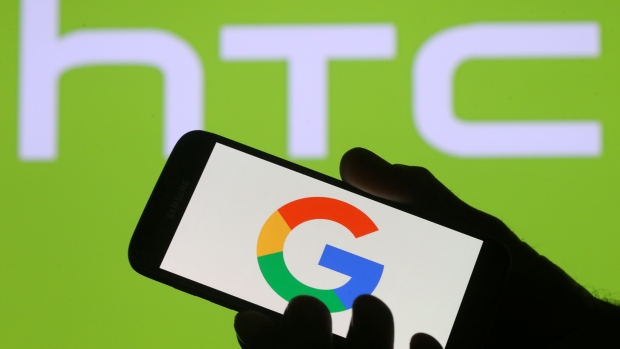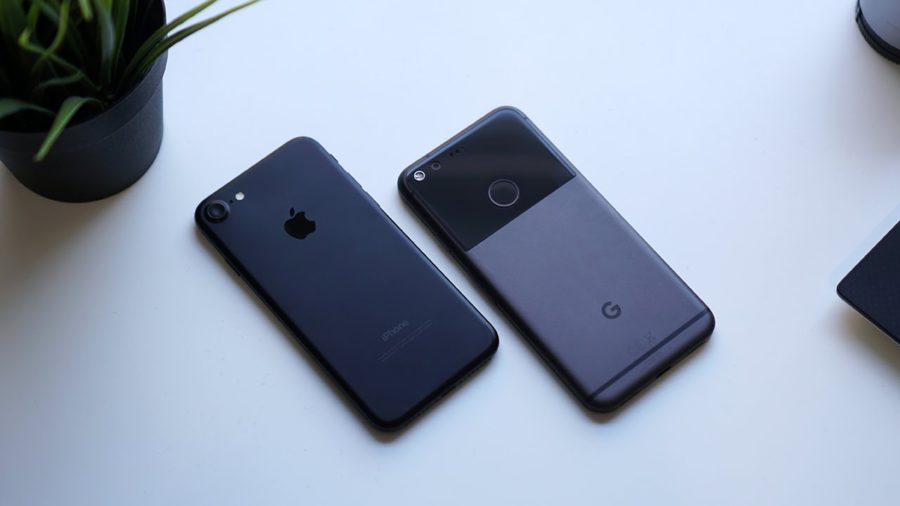On the prospects for a recent deal between the companies.

Original material
Google has already won the mobile war, at least when it comes to software. According to NetMarketShare Android it is the most popular mobile OS in the world, it is installed on 64.76% of smartphones and tablets worldwide and is twice the size iOS. Still, the next task for Google is much more difficult and it will take a long time to achieve it, but there is nothing unattainable here. The search giant must find a way to strip Samsung of the title of king of the premium Android smartphone segment and finally fight directly against iPhone. The goal can be achieved through a very recent purchase of a part of the assets and the team of the mobile unit HTC.
Google is not the first time to buy a mobile phone maker in the hope that the move will only strengthen the company's position in the smartphone market. In 2012, the company acquired Motorola Mobility for $ 12.5 billion and two years later sold this asset Lenovo for $ 2.9 billion.
It's all about control
The purchase HTC is fully justified. HTC was one of the first phone makers to switch to Android, and Google has worked with the company for many years to create Nexus smartphones and tablets. But will this purchase be anything different from the sensational story with Motorola?
With its mobile unit HTC (not to be confused with the VR unit), Google will no longer just design devices and then tell HTC to produce them. Instead, Google will have full control over all stages of production and will likely take over the rights to all of the company's various mobile patents HTC (which even Apple licenses). It is now easy to draw a parallel between Google, which designs and manufactures phones that run on its own OS, and Apple, which has consistently emphasized the importance of developing hardware and software at the same time.
But to be objective, the activities of the Google tandem – HTC will most likely be more similar to Samsung. The Korean giant designs, manufactures devices and uses TouchWiz to modify Android to fit its needs, and this approach works wonders. Samsung is the only competitor iPhone and the Galaxy lineup is the only premium handset to carry the weight.
From design to production
In fact, if Google had all the power of HTC, then such a scenario would be better than close collaboration between Samsung and Apple. Although Apple attributes the success iPhone to the deep integration of 'software' and hardware, it does not manufacture the devices, but only contracts with Foxconn for their mass production.

Google will literally make the phones in factories purchased from HTC. I can't judge the details of the deal (I'm sure Google can negotiate the production of the upcoming Pixel devices with Foxconn, Pegatron or another large assembly plant), but the absence of a middleman in this direction will give the company agility.
Late in the battle for the premium smartphone segment, Google needs to act quickly. The company has been unable to meet demand for Pixel smartphones months after launch. This failure meant not only a loss of sales, but also a loss of momentum. Last year, the Samsung Galaxy Note 7 literally blew up the market, prompting most owners to return their withdrawn smartphones. Google had a unique opportunity to step up its efforts and fill the void, but this did not happen, HTC simply could not produce the required number of Pixel smartphones.
You can blame Google for not predicting growth in demand or HTC, whose manufacturing process was torn between the Pixel and its own barely afloat smartphones. In any case, if Google wants to become a top device manufacturer, then this problem needs to be solved, and buying HTC may be the easiest solution. HTC will also benefit: the company's mobile division has been struggling lately. It's better to be absorbed by Google and release the best Android smartphones at its capacities, rather than HTC will continue to move along the path of releasing smartphones of a level below average, which no one buys.
Iron makes more money

There is no guarantee that Google will overtake Samsung or Apple, but it has been clear over the years that the company needs to change its strategy to compete directly with them for smartphone supremacy. Targeting the budget market with Nexus devices was a great move and helped reinforce the belief in accessibility and openness Android – devices (the two main reasons to buy Android, not super expensive iPhone), but in the long term this business strategy was deemed untenable.
The reason for the high cost of iPhone is that Apple makes a lot of profit from each device. On Nexus devices, Google had little or no emphasis on build and materials. The company has never stated that Nexus devices are profitable, and if not, then what a loss the company suffered from each device. Google, of course, is a public company, and although its mission is to organize world information flows, promote the idea of openness, as well as connect people and information, we are still talking about a business structure, the main priority of which is profit. Selling Pixel at prices iPhone means profit, potentially big profit. With the Pixel, Google gave everyone a sign that only a fool could not understand: the company is focusing on manufacturing its phones for its own software.
Steve Jobs believed that software and hardware could only bring about a revolutionary breakthrough in data processing if they were developed together. “We're the only company that controls everything — the operating system, hardware and software,” Jobs told Time magazine in 2002. “We are fully responsible for the user experience. We can do things that others cannot. ' Although Jobs is no longer with us, his principles continue to live on in devices Apple and are the reason for their continued success. Google was late for this celebration of life, but at least adjusted the vector of its movement. Now all Google needs to do is act, otherwise it will have another Motorola in its hands.
By Raymond Wong
I'm a little sorry HTC, I've always liked their smartphones, it was with them that I started my acquaintance with Android. But at this stage, the merger of the mobile division with Google seems to be a pretty good move, which (hopefully) will bring a decent result. In general, the story with HTC and Pixel became the second disappointment for me last year after SGN7. At first, delays in production, plus everything was not without bugs, which is unforgivable for the premium segment, this cannot be repeated from now on.
About competition with Apple. Looking at the recently announced smartphones, I involuntarily think that Android – manufacturers need to differentiate their devices as much as possible in order to intensify the confrontation, the winner of which is far from obvious. The road to Samsung is even more thorny, but what Jobs is not joking about. Nevertheless, the evidence of the success of the new Google project is still doubtful, I was more positive about the purchase Motorola, I hope I will be wrong this time too.
